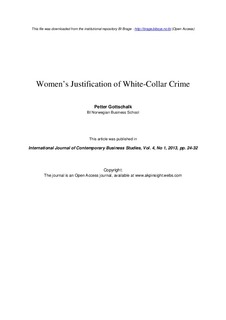| dc.contributor.author | Gottschalk, Petter | |
| dc.date.accessioned | 2013-04-15T07:54:10Z | |
| dc.date.available | 2013-04-15T07:54:10Z | |
| dc.date.issued | 2013 | |
| dc.identifier.citation | International Journal of Contemporary Business Studies, Vol. 4, No 1, 2013, pp. 24-32 | no_NO |
| dc.identifier.issn | 2156-7506 | |
| dc.identifier.uri | http://hdl.handle.net/11250/93870 | |
| dc.description | This is the originally published version of the article, as published in the journal International Journal of Contemporary Business Studies (Open Access) | no_NO |
| dc.description.abstract | In an empirical study of white-collar criminals in Norway, only 8 % out of 255 convicted
criminals in recent years were women. There are many potential explanations for the low
female share of crime. This paper concentrates on women’s lack of rationalization and
justification of the criminal act. Several arguments lead us to believe that the justification
to commit financial crime is less prominent among women. Examples include female fear
of being caught, where women perceive a greater subjective risk, and where the
consequences of imprisonment are perceived worse by women than men. | no_NO |
| dc.language.iso | eng | no_NO |
| dc.publisher | Academy of Knowledge Process | no_NO |
| dc.relation.uri | http://akpinsight-ijcbs.webs.com/%5B2%5D.Petter%20Gottschalk%20%20Jan%202013.pdf | |
| dc.subject | Financial crime | no_NO |
| dc.subject | empirical study | no_NO |
| dc.subject | neutralization theory | no_NO |
| dc.subject | theory of self-control | no_NO |
| dc.subject | white-collar crime | no_NO |
| dc.title | Women’s Justification of White-Collar Crime | no_NO |
| dc.type | Journal article | no_NO |
| dc.type | Peer reviewed | no_NO |
| dc.source.pagenumber | 24-32 | no_NO |
| dc.source.volume | 4 | no_NO |
| dc.source.journal | International Journal of Contemporary Business Studies | no_NO |
| dc.source.issue | 1 | no_NO |
